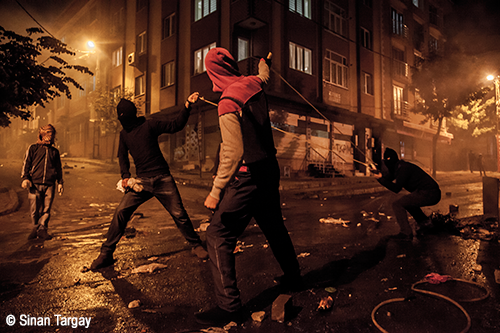Anthropology of Crime
and Criminalisation
European Association of Social Anthropologists (EASA) network


Anthropological Explorations of Violent Transfigurations of State, Crime and Politics across Contexts
May 20-22, 2021
Keynote Speech by
Prof Jean Comaroff (Harvard University)
Across the globe, we are witnessing collective dissent against police violence and (abusive) state practices alongside a resurrection of vigilante activities, that is citizens’ attempts to take law into their own hands to punish alleged criminals. While the perceived targets of these vigilante endeavours vary in different contexts – ranging from communities who are deemed illegal to those who are considered immoral-indecent and from those who slaughter cattle to elected members of parliaments – vigilante groups, by and large, act in defense of historically embedded structures and relations as well as moral orders.
While some scholarly explorations underline how vigilante groups strive to re-assert “law and order” independently of the state power (Johnston 1996; Moncanda 2017), scholars often tend to associate vigilantism with the “dysfunctioning” societal orders and “failed” statehood of the non-western settings (Kuˇcera and Mareš 2015). Critical anthropological approaches, on the other hand, demonstrate how the interrelationship between vigilante groups, statecraft, and the law may present a much more complicated picture that blurs the boundaries between crime and policing. These studies underline that vigilantism cannot be seen “just as a result of a state failure” (Arias 2013). Vigilantism, they show, does not solely emerge in the absence of an effective and non-corrupt judiciary and police structures, but may very well be incorporated into state security practices and frequently occurs in collusion with the state (Abrahams, 1998; Barker 2006; Buur, 2006; Goldstein, 2003; Schubert, 2013). Our research, similarly, indicates that vigilante violence may well augment and strengthen the state through its shouldering of stately responsibilities and (extralegal) violence against alleged criminals and the “enemies within.” Recent outbursts of vigilante violence in Russia, Latin America, India, Turkey, the UK, and the US, we argue, invite us to rethink its localized reconfigurations in relation to haunting legacies of colonialism, racism, economic inequalities, religious tensions, oppressive gendered structures, and post-Cold War polarizations.
Attending to the recent resurrection of vigilantism and its socio-political reverberations across the globe, this workshop explores vigilantism as a symptom that invites us to attend the complex and uneasy relationship between crime and policing as well as legal and extralegal forms of law enforcement, criminality, impunity, politics, and statecraft.
(please check your timezone by clicking on the time)
DAY I (May 20, 2021, Thursday) (Eventbrite)
Welcoming Remarks by the Organizers 12:15 CEST
PANEL I: Conceptualizing Vigilantism 12:30-14:30 CEST
Melina C. Kalfelis, University of Bayreuth
“Vigilantism as a Process: Reconsidering Violence through the Politics of the Koglweogo Self-Defense Groups in Burkina Faso”
Naomi van Stapele and Laurens Bakker, THUAS and UvA
“Vigilant Relationality: Securing the Local in Kenya and Indonesia during Times of COVID19”
Jacob Rasmussen, Roskilde University
“Parasitic Agency: Conceptualizing Vigilante Relational Actions vis-à-vis the State”
Discussant: David Pratten, University of Oxford
PANEL II: Law and Violence in Neighbourhoods 14:45-16:45 CEST
Rivke Jaffe, University of Amsterdam
“Vigilantism as Legal Hybridity: “Community Justice” in Urban Jamaica”
Ahmad Moradi, FU Berlin
“Vigilantism and Government of Poor Neighbourhoods in Iran”
Sebastian Ramirez, Princeton University
“Death Notice: Aesthetics of Vigilantism and Para-official Terror in Colombia”
Discussant: Deniz Yonucu, Technische Universität Berlin
KEYNOTE ADDRESS 17:00 CEST (11:00 EDT) (Eventbrite)
Prof Jean Comaroff, Harvard University
“Vigilantism and the Practices of Popular Sovereignty”
DAY II (MAY 21, 2021 FRIDAY) (Eventbrite)
OPENING SPEECH 12:30 CEST
Prof Tore Bjørgo, University of Oslo
“The Emergence and Decline of Vigilantism against Migrants and Minorities”
PANEL III: Tracing Vigilantism in Europe 13:30-15:30 CEST
Kristina Ilieva, University of Sussex
“Framing the ‘’Refugee Hunter’’: Gender and Nationalist Perspectives on Border Vigilance in Bulgaria”
Vincenzo Scalia, University of Winchester
“Cosa Nostra: An Unusual Vigilantism?”
Ana Ivasiuc, Philipps Universität Marburg
“‘The State Cannot Protect Us’: How Informal Policing (Un)Makes the State in Western Europe”
Discussant: Erol Saglam, Freie Universität Berlin and Istanbul Medeniyet University
PANEL IV: Religion, Morality, and the Margins of the Law 15.45-17.45 CEST
Geethika Dharmasinghe, Cornell University
“Whose Force is Violence? Sangha, Governance, and Authority”
Marcos Mendoza, University of Mississippi
“Partisan Forces: Tactical Vigilantism and Religious Protest in Michoacán, Mexico”
Salman Hussain, York University
“Miracles of the State: Blasphemy and Forced Disappearances in Pakistan”
Discussant: Martijn Oosterbaan, Utrecht University
DAY III (MAY 22, 2021 SATURDAY) (Eventbrite)
PANEL V: Political Reverberations 13:00-15.00 CEST
Aymon Kreil & Daniele Cantini, University of Ghent and Martin Luther Universität Halle-Wittenberg
“Bandits, Civic Associations, Revolutionary Agents? Popular Committees in Egypt, 2011–2013”
Justice Richard K. O. Kyei & Lidewyde H. Berckmoes, Kwame Nkrumah and Leiden Universities
“Political Vigilante Groups in Ghana: Violence or Democracy?”
Andy Fuller, Utrecht University
“Popular Cultures of Premanism: From Bandit to Religious Vigilantism”
Discussant: Davide Casciano, University of Bologna
PANEL VI: Agents of Security 15.15-17.15 CEST
Laurent Gayer, CNRS/CERI Sciences Po, Paris
“Punishers in Uniform: Punitive Police Work in Karachi, Pakistan”
Susana Durao & P. Argentin, University of Campinas State
“Shadow Plural Governance of Security: Internal Dynamics of Public-Private Patrimonial Protection”
Gilles Favarel-Garrigues, CERI Sciences Po, Paris
“‘You are a Disgrace to the Uniform!’: Challenging the Police in Moscow Streets”
Discussant: Tessa Diphoorn, Utrecht University
CLOSING REMARKS 17.30 CEST
Deniz Yonucu, Technische Universität Berlin
Erol Saglam, IMU and FU Berlin
Martijn Oosterbaan, Utrecht University
Download Vigilantism Resurrected Program PDF
The seminar will be held online on May 20-22, 2021 at times according to the program.
The seminar will be held on the software platform Zoom.